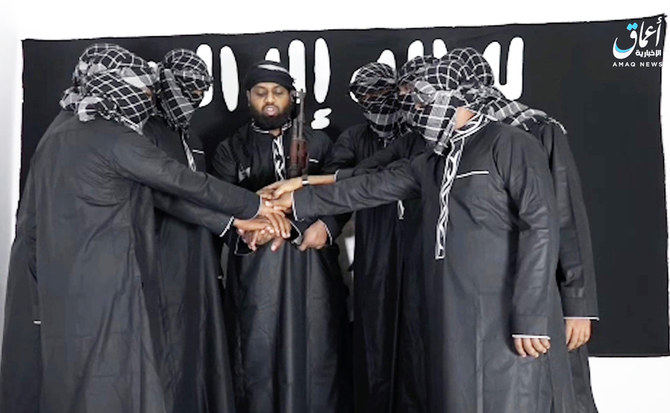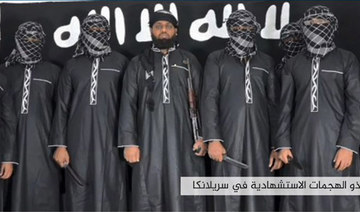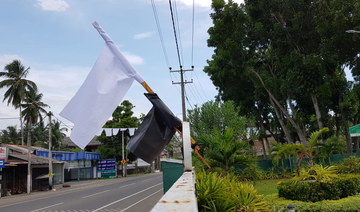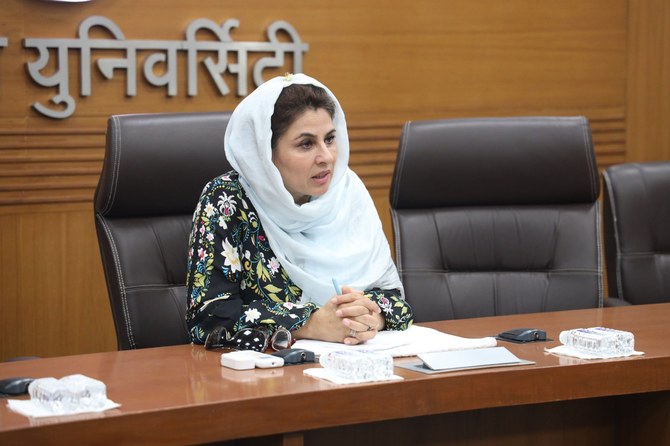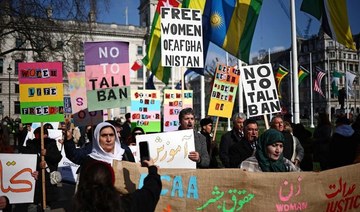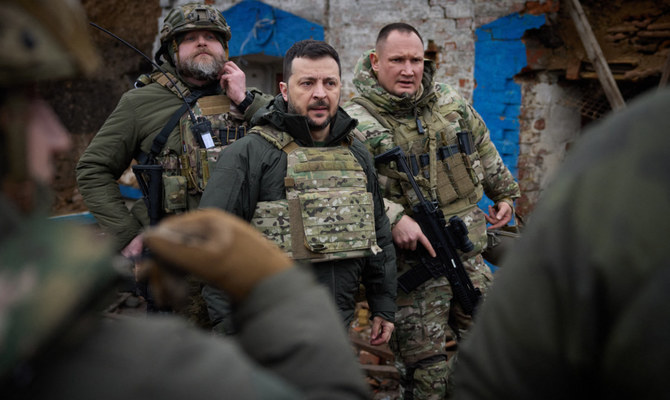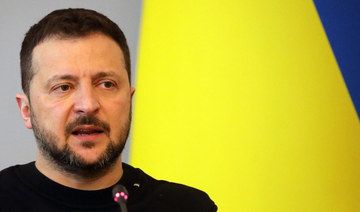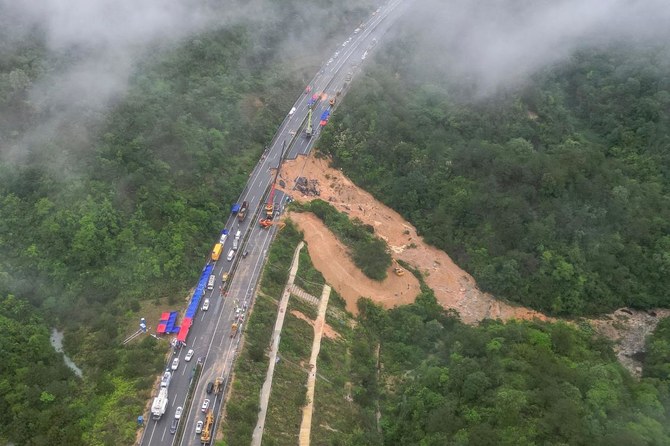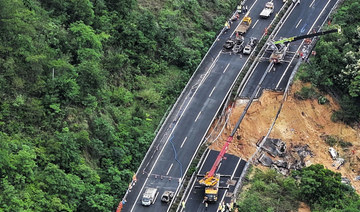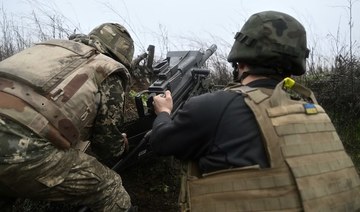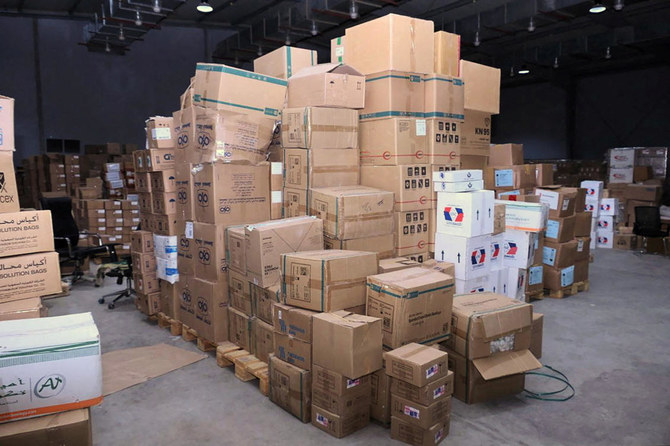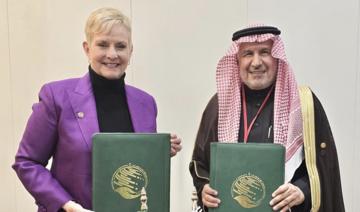ISLAMABAD, Pakistan: Until last Sunday, the only thing Zahran Hashim was known for was being a member of a local Sri Lankan group accused of defacing Buddhist statues.
Now, the obscure radical preacher is believed to be Daesh’s point person in Sri Lanka and the “mastermind” of the coordinated Easter Sunday attacks that have left 359 dead and more than 500 injured.
A video released by Daesh on Tuesday shows seven black-clad, masked men pledging allegiance to the organization, and an eighth man, whose face is visible, leading them. That man is Hashim. Security officials in Sri Lanka claim to have “credible information” that he was planning another attack targeting Muslim shrines that followed the mystical stream of Sufi Islam.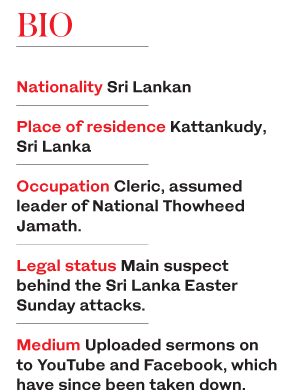
Sri Lanka has no history of Islamist extremism. The Sri Lankan government first named a local militant group, National Thowheed Jamath (NTJ), as the main suspect behind the attacks. It is one of the few Islamist radical groups operating in the country and was thus seen as the main contender for involvement with Daesh. Hashim is known to have been a member of the group until at least 2016 when security officials say he left and formed his own faction because the core group disapproved of his increasingly hard-line views.
Hashim was driven out of his hometown Kattankudy in eastern Sri Lanka by townspeople and moderate clerics because of his divisive teachings. Media reports say he received his early schooling in Kattankudy and then traveled to India to start a seven-year course on Islamic theology. He dropped out midway. Since then, he has reportedly traveled frequently between India and Sri Lanka.
Shunned by his hometown and the NTJ, Hashim found a small, but loyal, band of supporters online. Over the past two years, he gained thousands of followers for his impassioned sermons against non-Muslims on YouTube and a Sri Lankan Facebook account, which he called Al-Ghuraba Media and used to spread pro-Daesh propaganda.
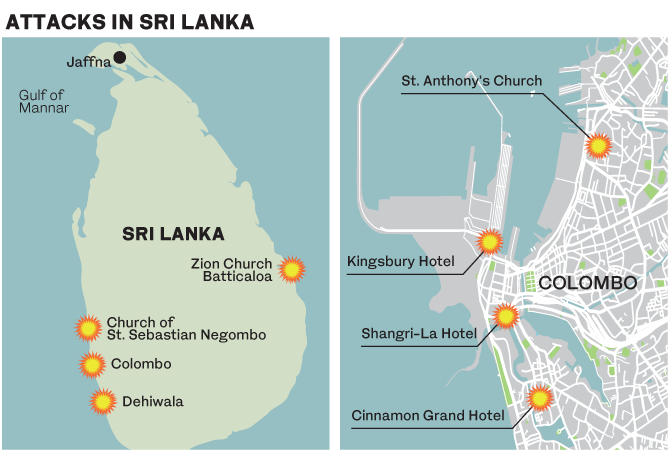
According to Robert Postings, a researcher whose work focuses on Daesh, Hashim had been a supporter of the group at least since 2017, when he began posting pro-Daesh propaganda on Facebook. In many of Hashim’s videos, the backdrop is images of the burning Twin Towers after the Sept. 11, 2001 attacks in the US.
Last year, Hashim appeared on intelligence officials’ radar after several of his students defaced three Buddhist statues in central Sri Lanka. The subsequent investigation led officers to a large weapons cache, including 100 kg of explosives and detonators, on the northwestern coast of Sri Lanka.
Opinion
This section contains relevant reference points, placed in (Opinion field)
Experts say Daesh has been recruiting for years in Sri Lanka and other Asian countries. On the ground, the group seems to have received help from Hashim after he created the Al-Ghuraba group. “That is the Islamic State (Daesh) branch in Sri Lanka,” said Rohan Gunaratna, a Singapore-based expert on militancy in the region.
Experts with knowledge of the investigations said Hashim’s faction of the NTJ was the “main player” in the Easter attacks and that he worked with international support, given the sophistication of the bombings and the fact that foreigners were targeted.
“Most Sri Lankans have not heard about this (National Thowheed Jamath) group before,” said Jehan Perera, executive director of the National Peace Council of Sri Lanka. “There is someone behind them, a handler.”
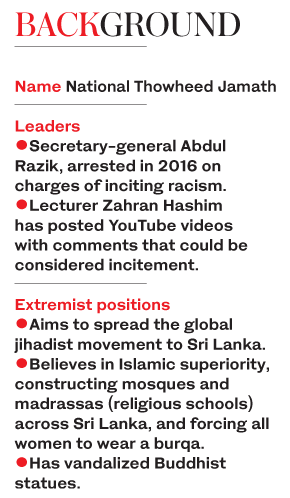
As of Thursday, Daesh had not provided any further proof for its claim of responsibility for the attacks, and Sri Lanka’s Defense Minister Ruwan Wijewardene said investigators were trying to determine if it had directly provided training or financing to the bombers. There was no evidence to suggest the bombers had traveled to the Middle East to fight for Daesh, he said..
“There were many people who understandably doubt that the attacks were a purely domestic operation,” said Taylor Dibbert, a Sri Lanka expert and fellow at the Pacific Forum.
“The investigation surrounding intelligence failures and the bombings should be done with significant international assistance. The Sri Lankan government cannot be trusted with this type of thing on its own,” he said.
TIMELINE OF SRI LANKA BLASTS
April 11
Sri Lanka’s police chief issues an intelligence alert, warning that suicide bombers from a group called National Thowheed Jamath plan to hit “prominent churches.”
April 21
8.45 a.m. Four bombs explode on Easter Sunday at the Shangri-La and Kingsbury hotels, and
St. Anthony’s church in Colombo; and St. Sebastian’s church in Negombo, north of the capital.
8.50 a.m. Explosion at Colombo’s Cinnamon Grand Hotel.
9.05 a.m. Blast hits the Zion Roman Catholic church in Batticaloa on Sri Lanka’s
east coast.
1.45 p.m. Explosion at the New Tropical Inn, Dehiwala.
2.15 p.m. Three police officers are killed in an explosion while raiding a house in Colombo.
8 p.m. Curfew begins in the capital; police say they have made their first arrests.
April 22
4 a.m. Evening curfew is lifted amid tight security. Police find 87 detonators at Colombo’s main bus stand.
8 p.m. Another night curfew begins.
April 23
Midnight State of emergency comes into effect.
Daesh releases a video that shows eight men, all but one with their faces covered, standing under the terror group’s flag and declaring their loyalty to its leader, Abu Bakr Al-Baghdadi. The man with his face uncovered is identified as Moulvi Zahran Hashim, a preacher known for his militant views.
April 24
Bomb squads carry out controlled explosions of suspicious packages; US Secretary of State Mike Pompeo says there is “every indication” the bomb attacks were inspired by Daesh.
April 25
Sri Lanka’s Catholic churches suspend all public services over security fears.




